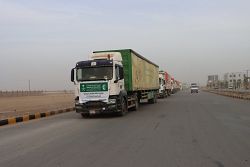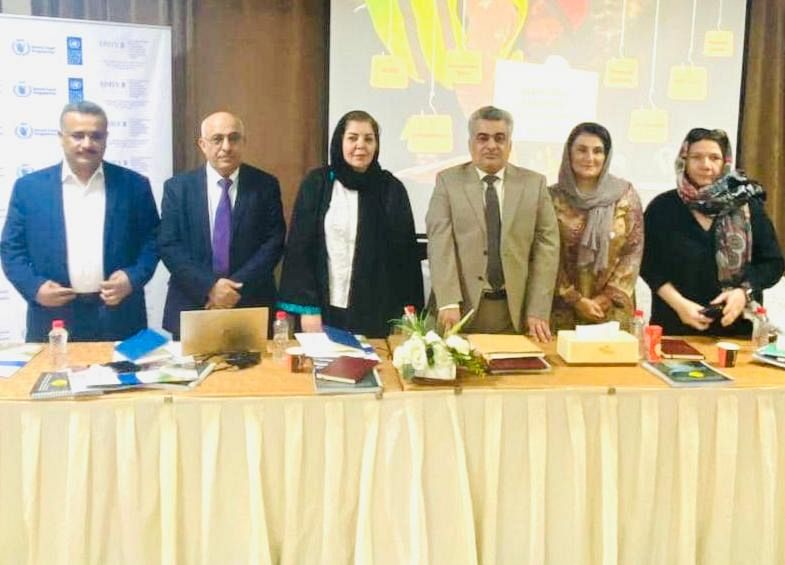
Emergency Relief Convoy from KSrelief Arrives in Marib
An emergency relief convoy provided by the King Salman Humanitarian Aid and Relief Center (KSrelief) arrived in Marib Governorate on Sunday, as part of efforts to address the growing humanitarian needs of displaced families in the governorate.

Massive 7.0 Magnitude Earthquake Strikes Alaska, USA
A powerful 7.0 magnitude earthquake struck Alaska, USA, yesterday evening, according to the United States Geological Survey (USGS).

Japan's LNG imports down 1.4 percent
Japan's liquefied natural gas (LNG) imports fell 1.4 percent to 64.98 million tons last year 2025, compared to 2024. according to provisional data released by the Japanese Ministry of Finance today, Thursday.

Paris Saint-Germain temporarily tops the French league after their win against Auxerre
Paris Saint-Germain defeated Auxerre 1-0 in their Ligue 1 match on Matchday 19.
Last Update: ،
2026/01/25
Time
09:38:31
Latest News:
 Prime Minister receives Italian Ambassador
Prime Minister receives Italian Ambassador
 Presidential Leadership Council Member al-Subaihi confers with U.S. Ambassador over partnership in fighting ..
Presidential Leadership Council Member al-Subaihi confers with U.S. Ambassador over partnership in fighting ..
 President al-Alimi Congratulates on Australia National Day
President al-Alimi Congratulates on Australia National Day
 Arab Parliament reiterates its support for Yemen's unity, sovereignty, territorial integrity
Arab Parliament reiterates its support for Yemen's unity, sovereignty, territorial integrity
 First Batch of Petroleum Derivatives Grant to Socotra Governorate Arrived
First Batch of Petroleum Derivatives Grant to Socotra Governorate Arrived
Latest News:
 Prime Minister receives Italian Ambassador
Prime Minister receives Italian Ambassador
 Presidential Leadership Council Member al-Subaihi confers with U.S. Ambassador over partnership in fighting ..
Presidential Leadership Council Member al-Subaihi confers with U.S. Ambassador over partnership in fighting ..
 President al-Alimi Congratulates on Australia National Day
President al-Alimi Congratulates on Australia National Day
 Arab Parliament reiterates its support for Yemen's unity, sovereignty, territorial integrity
Arab Parliament reiterates its support for Yemen's unity, sovereignty, territorial integrity
 First Batch of Petroleum Derivatives Grant to Socotra Governorate Arrived
First Batch of Petroleum Derivatives Grant to Socotra Governorate Arrived
Project Steering Committee for Livelihoods Support, Food Security held meeting
[28/02/2024 02:20]
ADEN-SABA
The Project Steering Committee for Livelihoods Support, Food Security, and Climate Adaptation in Yemen (Phase III) held its meeting here on Wednesday.
The meeting was chaired by Deputy Minister of Planning and International Cooperation Dr. Nizar Basuhayb to discuss the implementation of the project funded by the European Union and implemented by the Swedish International Development Cooperation Agency (SIDA) with the support from the United Nations agencies.
Dr. Basuhayb emphasized the importance of the project as one of the economic empowerment initiatives that contribute to improving food security, supporting small farmers, reducing malnutrition, mitigating climate change risks, and serving as a distinguished model for livelihood projects and employment opportunities for farmers.
He also highlighted the project's role in increasing agricultural productivity, empowering youth and women to own agricultural assets, and enhancing technical and vocational skills in rural areas.
Furthermore, Dr. Basuhayb reaffirmed the government's commitment to addressing the economic and livelihood conditions, providing basic services and supporting the agricultural and fisheries sectors in partnership with donors and Yemen's development partners.
He discussed the structural and emerging challenges facing development in Yemen in general, and the agricultural sector in particular, such as water resource scarcity, low agricultural productivity, heavy reliance on food imports (up to 90%), the impact of war and conflict, and Yemen's vulnerability to climate change.
He commended the level of strategic partnership with the European Union and its significant contributions in supporting Yemen in various vital areas, particularly livelihoods, agriculture, food security, women's empowerment, human rights and sustainable peace.
He stressed that the Ministry of Planning prioritizes the agricultural sector and food security in mobilizing external funding to contribute to reducing food insecurity and alleviating the humanitarian crisis affecting 80% of the population. He also highlighted that the agricultural sector contributes for around 20% of the gross domestic product and employs over 60% of the workforce.
For her part, Nadia al-Awamleh, the Deputy Resident Representative of the United Nations Development Program (UNDP), emphasized the economic and social importance of the project and the efforts of UNDP in supporting development in Yemen and transferring from relief to development.
The Project Steering Committee for Livelihoods Support, Food Security, and Climate Adaptation in Yemen (Phase III) held its meeting here on Wednesday.
The meeting was chaired by Deputy Minister of Planning and International Cooperation Dr. Nizar Basuhayb to discuss the implementation of the project funded by the European Union and implemented by the Swedish International Development Cooperation Agency (SIDA) with the support from the United Nations agencies.
Dr. Basuhayb emphasized the importance of the project as one of the economic empowerment initiatives that contribute to improving food security, supporting small farmers, reducing malnutrition, mitigating climate change risks, and serving as a distinguished model for livelihood projects and employment opportunities for farmers.
He also highlighted the project's role in increasing agricultural productivity, empowering youth and women to own agricultural assets, and enhancing technical and vocational skills in rural areas.
Furthermore, Dr. Basuhayb reaffirmed the government's commitment to addressing the economic and livelihood conditions, providing basic services and supporting the agricultural and fisheries sectors in partnership with donors and Yemen's development partners.
He discussed the structural and emerging challenges facing development in Yemen in general, and the agricultural sector in particular, such as water resource scarcity, low agricultural productivity, heavy reliance on food imports (up to 90%), the impact of war and conflict, and Yemen's vulnerability to climate change.
He commended the level of strategic partnership with the European Union and its significant contributions in supporting Yemen in various vital areas, particularly livelihoods, agriculture, food security, women's empowerment, human rights and sustainable peace.
He stressed that the Ministry of Planning prioritizes the agricultural sector and food security in mobilizing external funding to contribute to reducing food insecurity and alleviating the humanitarian crisis affecting 80% of the population. He also highlighted that the agricultural sector contributes for around 20% of the gross domestic product and employs over 60% of the workforce.
For her part, Nadia al-Awamleh, the Deputy Resident Representative of the United Nations Development Program (UNDP), emphasized the economic and social importance of the project and the efforts of UNDP in supporting development in Yemen and transferring from relief to development.
Key words:
Furthermore - implementation - Representative - International - contributions - vulnerability - distinguished - opportunities - government's - productivity - Emergency Relief Convoy from KSrelief Arrives in Marib
Emergency Relief Convoy from KSrelief Arrives in Marib Prime Minister receives Italian Ambassador
Prime Minister receives Italian Ambassador Presidential Leadership Council Member al-Subaihi confers with U.S. Ambassador over partnership in fighting terrorism
Presidential Leadership Council Member al-Subaihi confers with U.S. Ambassador over partnership in fighting terrorism President al-Alimi Congratulates on Australia National Day
President al-Alimi Congratulates on Australia National Day Arab Parliament reiterates its support for Yemen's unity, sovereignty, territorial integrity
Arab Parliament reiterates its support for Yemen's unity, sovereignty, territorial integrity  First Batch of Petroleum Derivatives Grant to Socotra Governorate Arrived
First Batch of Petroleum Derivatives Grant to Socotra Governorate Arrived  Ministry of Electricity: Emirati Company Suddenly Shut Down Solar Power Plants in Aden, Shabwa
Ministry of Electricity: Emirati Company Suddenly Shut Down Solar Power Plants in Aden, Shabwa Yemen’s Ambassador Discusses Issues of Mutual Interest with Cuba’s Deputy Minister of Foreign Affairs
Yemen’s Ambassador Discusses Issues of Mutual Interest with Cuba’s Deputy Minister of Foreign Affairs Deputy Chief of Staff Discusses ICRC's Medical, Humanitarian Interventions in Yemen
Deputy Chief of Staff Discusses ICRC's Medical, Humanitarian Interventions in Yemen China reaffirms its commitment to supporting peace efforts in Yemen
China reaffirms its commitment to supporting peace efforts in Yemen 


